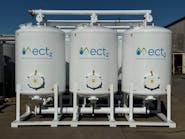Currently, manufacturers in the municipal water space must comply with American Iron and Steel (AIS) requirements as originally passed by Congress in the Consolidated Appropriations Act of 2014. Municipalities that want to use drinking water and clean water state revolving loan funds, WIFIA funding, or funding from the USDA Rural Utility Service must certify that specific products made of iron and steel and listed by Congress are manufactured in the United States. A comprehensive waiver process has been established for those listed products that cannot be made in the U.S.
On November 15, 2021, President Joe Biden passed a bipartisan infrastructure bill (H.R. 3684), titled the Infrastructure Investment and Jobs Act. This bill is the foundation of the Biden Administration’s $1.2 trillion infrastructure plan. Significant expansion of Buy America/domestic content requirements are also included. The legislation will likely have far-reaching repercussions for the water sector.
The Infrastructure Bill applies all new domestic content requirements to not only the current funding mechanisms listed above but also for every other loan and grant program administered by EPA, USDA, the Bureau of Reclamation, U.S. Army Corps of Engineers, and across the entire federal government.
Instead of applying to a specific list of iron and steel products, the bill states “The term ‘domestic content procurement preference’ means a requirement that no amounts made available through a program for Federal financial assistance may be obligated for a project unless — (a) all iron and steel used in the project are produced in the United States; (b) the manufactured products used in the project are produced in the United States; or (c) the construction materials used in the project are produced in the United States.”
The bill defines “construction materials” to mean “common construction materials used in public works infrastructure projects including steel, iron, manufactured products, non-ferrous metals, plastic and polymer-based products (including PVC, composite building materials, and polymers used in fiber optic cables), glass (including optic glass), lumber, and drywall.”
Lastly, the bill defines the term ‘‘produced in the United States’’ to mean — “(a) in the case of iron or steel products, that all manufacturing processes, from the initial melting stage through the application of coatings, occurred in the United States; (b) in the case of manufactured products, that — (i) the manufactured product was manufactured in the United States; and (ii) the cost of the components of the manufactured product that are mined, produced, or manufactured in the United States is greater than 55 percent of the total cost of all components of the manufactured product, unless another standard for determining the minimum amount of domestic content of the manufactured product has been established under applicable law or regulation; and (c) in the case of construction materials, that all manufacturing processes for the construction material occurred in the United States.”
Manufacturers have six months from the date of enactment to source their products in the U.S. An additional layer of review will be needed, as all waivers must be approved by the Made in America Office, located in the Office of Management and Budget.
The Biden Administration has also made it clear that waivers will be the exception and not the rule. Now is the time to review your products and supply chain and make sure you are positioned to meet these potential new requirements. WW
About the Author: Vanessa Leiby is the executive director of the Water and Wastewater Equipment Manufacturers Association (WWEMA). WWEMA, a non-profit trade association formed in 1908, represents many of the most prominent and influential water and wastewater technology manufacturers working together to shape the future of our industry. Learn more about WWEMA at www.wwema.org.
Published in WaterWorld magazine, December 2021.



